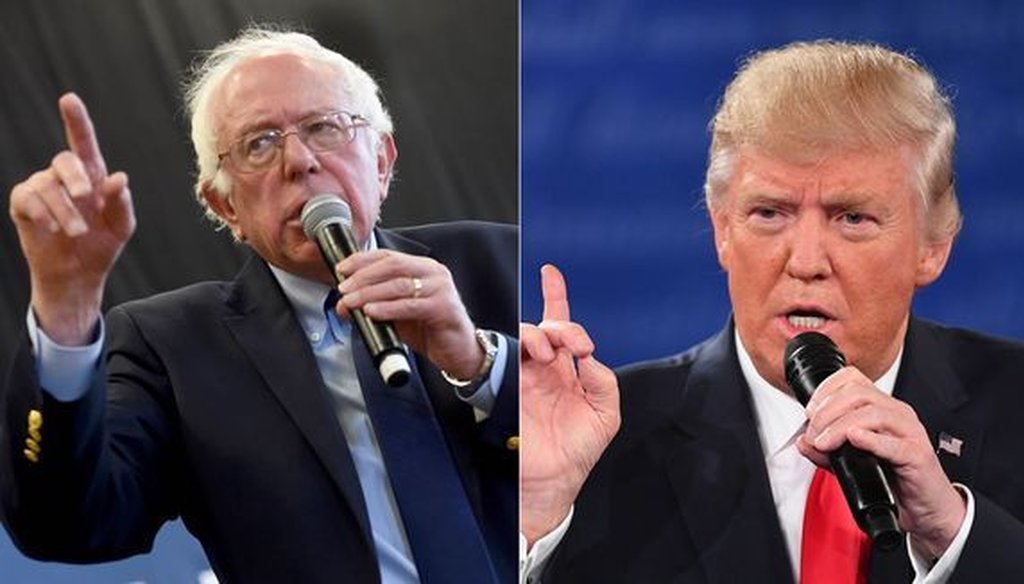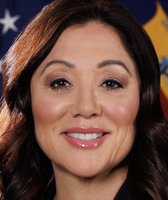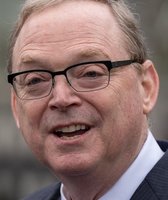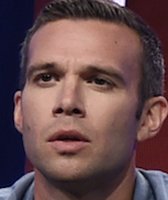Get PolitiFact in your inbox.

Both Bernie Sanders (left) and President Donald Trump have sought out small-dollar contributions in their campaigns for president.
U.S. Sen. Bernie Sanders likes to talk up grassroots support of his presidential campaign, and one of his favorite metrics is individual donations.
"I feel very good with the fact that we have now received some 2 million individual contributions — which I think is an all-time world's record — up to this point, averaging all of $19 apiece," Sanders said in a recent interview with MSNBC’s Rachel Maddow.
The independent from Vermont and his campaign have repeatedly made this specific boast.
Could we fact-check that? Not under today’s campaign finance rules.
"This is completely unverifiable, since the contributions from donors of $200 (total) or less are not disclosed" to the Federal Election Commission, Michael Malbin, director of the Campaign Finance Institute at the National Institute on Money in Politics, told us. "Maybe true, maybe not. Who knows?"
Sign up for PolitiFact texts
Other experts in campaign finance told us the same thing.
"Under federal campaign finance laws, contributions from a single individual to a single candidate do not have to be reported until they exceed $200, so, unless Sanders chooses to voluntarily disclose the information for small contributions in his FEC filings, there is no way to verify the information," said David Primo, a professor of political science and business administration at the University of Rochester in New York.
The next FEC filing date is not until July 15.
Sanders’ number
Sanders has a record of raising a large percentage of his campaign funds from small donors. His campaign staff told us that, since the launch of the campaign in February, there have been nearly 2 million individual donations.
That includes one person making one contribution, as well as other contributors making multiple contributions.
That’s one reason a campaign likes small donors: They can make multiple contributions over a period of time without reaching the federal limit of $2,800.
At this same stage of his 2008 run for president, the campaign for Barack Obama said it had received 258,000 donations, the "foundation of an unprecedented volunteer army in all 50 states."
Why individual contributions matter
Other candidates seeking the 2020 Democratic nomination have also sought small donors.
U.S. Sen. Elizabeth Warren of Massachusetts has made personal calls to small-dollar donors and turned some of the calls into web videos. Pete Buttigieg, the mayor of South Bend, Ind., has had success seeking small donations online.
"Democratic presidential primary candidates are competing to be the candidate of the small donor in part because Sanders and others have shown it’s a viable route and a friendly narrative," the Center for Public Integrity reported in an article about courting small-dollar donors.
Republicans have focused on small donors, too.
In his 2016 campaign for president, Donald Trump reported that 69% of his individual contributions came from small donors, compared to Sanders’ 44% in 2016, Hillary Clinton’s 22% (2016), and Obama’s 28% in 2012 and 24% in 2008, according to the Campaign Finance Institute.
Some of the other reasons for soliciting small donations:
• Warren has said small donors are more likely to engage in nonmonetary ways, such as door-knocking and making phone calls.
• As the Trump re-election campaign widens its base of small donors, it also "gains contact information for activists and accumulates insights into what sells to the narrow group of persuadable voters Trump potentially could win over," the Los Angeles Times observed.
• The Democratic National Committee decided to use grassroots fundraising as one of two ways to earn a spot in the first two primary debates — candidates had to get contributions from at least 65,000 unique donors and a minimum of 200 unique donors per state in at least 20 states.
• The DNC said it required candidates to provide verifiable evidence of their donors. They may do this by authorizing ActBlue, which provides a software platform for people to contribute to Democratic campaigns through personal computers and cell phones; or through NGP VAN, a technology provider to Democratic campaigns.
The small donor will continue to be courted.
"It would be interesting to see how Sanders’ numbers compare with other candidates" in the 2020 race, said Primo.
"All of this said, (Sanders’) figures are clearly evidence of strong grassroots support."
Our Sources
MSNBC, Rachel Maddow interview of Bernie Sanders (3:10), July 10, 2019
Email, Bernie Sanders campaign deputy communications director Sarah Ford, July 11, 2019
Email, David Primo, professor of political science and business administration at the University of Rochester, July 12, 2019
Email, Michael Malbin, director of the Campaign Finance Institute at the National Institute on Money in Politics, July 11, 2019
Center for Public Integrity, "Why Democrats Are Falling Over Themselves To Find Small-dollar Donors," April 17, 2019
Politico, "Warren puts Sanders on notice with $19 million fundraising haul," July 8, 2018
New York Times, "Bernie Sanders Raises $18 Million in 3 Months, Trailing Buttigieg," July 2, 2019
National Public Radio, "Small Donors Hold The Key To Campaign Buzz And The Democrats' Debate Stage," March 23, 2019
Los Angeles Times, "Trump’s big, early lead in Facebook ads deeply worries Democratic strategists," June 12, 2019
Campaign Finance Institute, news release, Feb. 21, 2017
Email, Stetson University law professor Ciara Torres-Spelliscy, July 12, 2019
Email, Northwestern University law professor Michael Kang, July 12, 2019
BernieSanders.com, "Bernie 2020 Reports $24 Million in Q2," July 2, 2019
Email, Campaign Legal Center media strategist Corey Goldstone, July 12, 2019
Politico, "Here are the qualifications for the first 2020 Democratic debates," May 9, 2019
Democratic National Committee, news release, Feb. 14, 2019






























